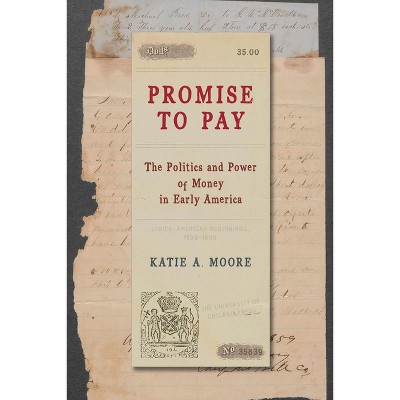Sponsored

Banking on Slavery - (American Beginnings, 1500-1900) by Sharon Ann Murphy
$105.00
In Stock
Eligible for registries and wish lists
Sponsored
About this item
Highlights
- A sobering excavation of how deeply nineteenth-century American banks were entwined with the institution of slavery.
- About the Author: Sharon Ann Murphy is professor of history at Providence College.
- 432 Pages
- Business + Money Management, Banks & Banking
- Series Name: American Beginnings, 1500-1900
Description
About the Book
"Sharon Murphy's book is a powerful and unprecedented dive into the entangled history of banking and slavery in nineteenth-century America. Slaveholders developed credit and creditworthiness by using enslaved people as collateral, and this allowed them to undertake an endless array of projects. But Murphy further shows that this credit system grew and changed as banks sought new ways to realize their own profits and power. She demonstrates not merely how slavery was financed by banks but how banks were financed by slavery. By extension, everything banks enabled, not least the physical expansion of the United States itself, was also then literally indebted to that noxious institution"--Book Synopsis
A sobering excavation of how deeply nineteenth-century American banks were entwined with the institution of slavery. It's now widely understood that the fullest expression of nineteenth-century American capitalism was found in the structures of chattel slavery. It's also understood that almost every other institution and aspect of life then was at least entangled with--and often profited from--slavery's perpetuation. Yet as Sharon Ann Murphy shows in her powerful and unprecedented book, the centrality of enslaved labor to banking in the antebellum United States is far greater than previously thought. Banking on Slavery sheds light on precisely how the financial relationships between banks and slaveholders worked across the nineteenth-century South. Murphy argues that the rapid spread of slavery in the South during the 1820s and '30s depended significantly upon southern banks' willingness to financialize enslaved lives, with the use of enslaved individuals as loan collateral proving central to these financial relationships. She makes clear how southern banks were ready--and, in some cases, even eager--to alter time-honored banking practices to meet the needs of slaveholders. In the end, many of these banks sacrificed themselves in their efforts to stabilize the slave economy. Murphy also details how banks and slaveholders transformed enslaved lives from physical bodies into abstract capital assets. Her book provides an essential examination of how our nation's financial history is more intimately intertwined with the dehumanizing institution of slavery than scholars have previously thought.Review Quotes
"Until now, we have not understood in precise detail how southern banks made possible the spread and growth of slavery in the United States. Sharon Ann Murphy, a master at explaining and analyzing the nitty-gritty of how financial institutions and practices worked, has completed yet another act of scholarly service by hunting down the extant records of obscure banking transactions. . . . Readers will gain new insight into the histories of southern life, slavery, and the nineteenth-century economy. These are unsettling rewards."-- "Journal of Southern History"
"Amid a growing body of literature on slavery and American capitalism, Sharon Ann Murphy's Banking on Slavery proves that there is still room for scholars to grapple with the question of how slavery shaped American economic development. The well-researched, engaging book sheds new light on the connections between the development of commercial banking
and the extension of the plantation economy into the southern frontier."-- "Journal of the Civil War Era"
"Banking on Slavery evinces deep research in the surviving records of financial institutions, as well as in the documents produced by litigation over them and manuscript sources. Murphy also does yeoman's work in highlighting the silences forced upon the people ensnared in these transactions, naming them wherever possible. . . The resulting work is exacting in its detail, precise in its accounting, and devastating in its depiction of the ties between slavery and finance in the antebellum South and will reward careful readers with a significantly deeper understanding of the evolution of American slavery."-- "H-Early-America"
"Sharon Ann Murphy's richly detailed book, Banking on Slavery: Financing Southern Expansion in the Antebellum United States, deepens our understanding on how slaveholders used banks to finance the development of the frontier South through a detailed analysis of debt contracts, legal cases, and banking policies. Murphy has provided scholars of U.S. slavery and of U.S. financial history with essential details on how banks achieved the financialization of enslaved people, how these banking practices contributed to the growth of the Southern economy, and where Southern frontier banks fit in the context of the nineteenth-century U.S. financial system. And, furthermore, the author adds to the literature on the history of capitalism by clearly showing that, while banking had a lasting affect on slavery, slavery did not have a lasting impact on U.S. commercial banking."-- "Business History Review"
"Banking on Slavery fills an important need in our historical understanding. . . .This is one of the very few book-length studies of how banks in the South financed the expansion of slavery into the Old Southwest. Deeply researched and well-grounded in both primary sources and sound secondary scholarship, this excellent book is most welcome and should be read by anyone interested in the history of American slavery."-- "Emerging Civil War"
"This book is well worth reading for scholars of banking history, slavery, and antebellum institutions generally. The author has clearly done her homework in various archives, and the details associated with individual cases are often fascinating."-- "EH.net"
"Murphy's meticulously researched and clearly written study examines the role of banks in what she terms the concomitant 'financialization' of human property and the southwestern expansion of plantation economies in the mid-19th-century South. . . . The lives of enslaved persons caught in the web of the capitalist marketplace haunt the pages of Murphy's excellent work."-- "Choice"
"More surprising has been the lack of historical analysis of the banking firms and financial practices that underwrote the expansion of slavery in the antebellum United States. In her groundbreaking new book, Banking on Slavery, historian Sharon Ann Murphy corrects this glaring omission."-- "Sean Vanatta, Wharton Initiative on Financial Policy and Regulation"
"In a pathbreaking account of the way Americans financed slavery, Murphy connects the vast sweep of that tragedy to the banking that made it possible. Detail by dollar detail, she exposes the structures that transmuted enslaved people into assets and collateral, building white wealth all the while. A powerful--and chilling--book."--Christine Desan, author of Making Money: Coin, Currency, and the Coming of Capitalism
"A tremendous accomplishment. We cannot fully understand the history of banking in the United States without reckoning with Murphy's important findings. Banking on Slavery sets the stage for new understandings of the history of capitalism and its relation to slavery."-- "Claire Priest, author of Credit Nation: Property Laws and Institutions in Early America"
About the Author
Sharon Ann Murphy is professor of history at Providence College.Dimensions (Overall): 9.0 Inches (H) x 6.0 Inches (W) x 1.13 Inches (D)
Weight: 1.76 Pounds
Suggested Age: 22 Years and Up
Number of Pages: 432
Genre: Business + Money Management
Sub-Genre: Banks & Banking
Series Title: American Beginnings, 1500-1900
Publisher: University of Chicago Press
Format: Hardcover
Author: Sharon Ann Murphy
Language: English
Street Date: April 5, 2023
TCIN: 1006099372
UPC: 9780226824598
Item Number (DPCI): 247-47-4814
Origin: Made in the USA or Imported
If the item details aren’t accurate or complete, we want to know about it.
Shipping details
Estimated ship dimensions: 1.13 inches length x 6 inches width x 9 inches height
Estimated ship weight: 1.76 pounds
We regret that this item cannot be shipped to PO Boxes.
This item cannot be shipped to the following locations: American Samoa (see also separate entry under AS), Guam (see also separate entry under GU), Northern Mariana Islands, Puerto Rico (see also separate entry under PR), United States Minor Outlying Islands, Virgin Islands, U.S., APO/FPO
Return details
This item can be returned to any Target store or Target.com.
This item must be returned within 90 days of the date it was purchased in store, shipped, delivered by a Shipt shopper, or made ready for pickup.
See the return policy for complete information.











